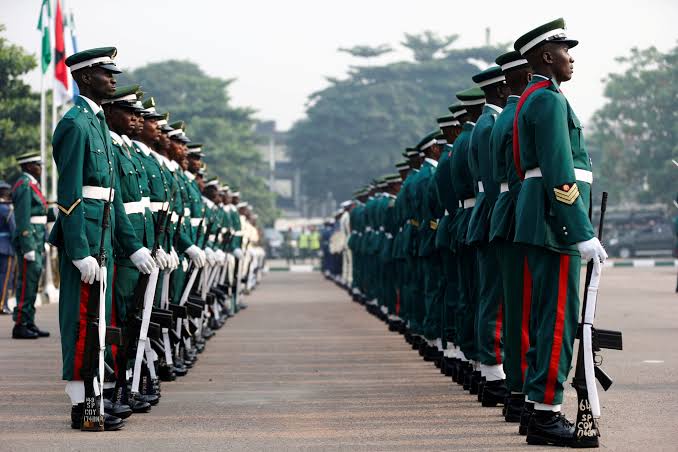The Nigerian Army is currently facing a troubling trend that has raised questions about its recruitment process and internal discipline. Two separate incidents involving soldiers have sparked concerns and led to speculation about the enlistment of former Boko Haram members into the Nigerian Army.
The first incident involves Private Yahaya Sani, a soldier attached to the 74 Supply and Transportation Brigade, 82nd (Airborne and Amphibious) Division of the Nigerian Army. Private Sani allegedly stabbed his colleague, Private Aliyu Musa, following an accusation of theft. Musa had complained about a missing phone, which he alleged Sani had taken. The altercation escalated, leading to Sani allegedly stabbing Musa with a dagger. Musa is currently receiving treatment, while Sani is under investigation.
The second, more disturbing incident involves Private Mohammed Adamu, who is accused of killing a pregnant woman, Miss Hauwakulu Tabra, at the 82nd Division of the Nigerian Army in Enugu. According to reports, Adamu, who was in a relationship with Tabra, allegedly murdered her in a gruesome manner, slitting her throat and stabbing her belly multiple times. It is alleged that Adamu, a former member of the Civilian Joint Task Force (CJTF), joined the Nigerian Army in 2021 after repenting from Boko Haram.
These incidents have raised concerns about the recruitment process in the Nigerian Army and the possibility of former Boko Haram members being enlisted. The Nigerian Army has denied enlisting repentant Boko Haram members, stating that considerations are given to CJTF members who have shown commitment and loyalty.
While the the Army has emphasized that these incidents are isolated and do not reflect its overall recruitment process, the incidents highlight the need for stricter screening procedures and better mental health support for soldiers. The recruitment of former CJTF members, who have played a crucial role in the fight against Boko Haram, should be conducted with thorough background checks and psychological evaluations to prevent such incidents in the future.
These incidents also underscore the importance of addressing internal issues within the Nigerian Military, including discipline and mental health. Proper training and support for soldiers, as well as effective leadership, are essential in maintaining the integrity and professionalism of the Nigerian Army.
As Nigeria continues to grapple with security challenges, including the threat of Boko Haram, it is crucial for the military to uphold the highest standards of professionalism and accountability. The safety and security of civilians and soldiers alike depend on it.

Leave a Reply
You must be logged in to post a comment.